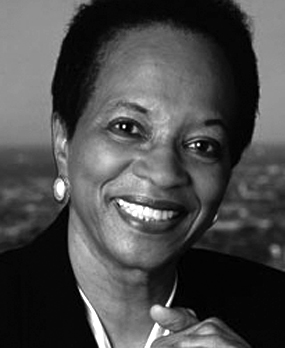Dr. Reatha Clark King:
How she has transformed the scene
From the farm fields of Georgia to astronauts on the moon
Reatha Clark King didn't set out to become a research chemist who would one day help NASA discover rocket fuels for the space program. Nor did she intend to become a college professor, university president or executive director of a large foundation. Rather, she set her sights on a career as a home economics teacher.
Clark King was born in the rural Deep South of Georgia long before the civil rights movement, when Jim Crow laws created a system of economic, social and educational disadvantages for black Americans. The daughter of a poorly educated sharecropper and a domestic servant who divorced when she was young, Clark King and her two sisters moved around Southern Georgia several times, and spent summers picking cotton and gathering tobacco in the fields to earn money.
And yet, Clark King's bright mind could not be muted by the difficulty of her circumstances. She graduated as valedictorian of Moultrie High School for Negro Youth in 1954 and received a scholarship to Clark College in Atlanta, where she declared home economics as her major. Clark King explains, "At that time, women were told that the appropriate work for them was to be a nurse, social worker or teacher, particularly if you were going to get a degree, a home economics teacher."
"Chemistry just turned me on!"
Clark King on discovering her passion for science
Clark King's path took a sharp turn when she enrolled in freshman chemistry (a home economics requirement) and met Professor Alfred Spriggs, who encouraged Clark King to pursue chemistry. Clark King was then faced with the difficult task of telling her mother that she would not be returning to her hometown to teach home economics. She recalled, "That would have been an elevation of stature for our whole family, to have a child who's a teacher in the local high school."
After graduating from Clark College, she was awarded a Woodrow Wilson fellowship that made it financially possible for her to attend graduate school. Clark King received her doctorate in 1963, becoming one of the first African-American women to receive a Ph.D. in Chemistry from the University of Chicago.
"It was a good feeling to know that your work was part of something really big,"
Clark King on her National Bureau of Standards work for NASA
From 1963 to 1968, Clark King was a research chemist with the prestigious National Bureau of Standards (known today as the National Institute of Standards and Technology) in Washington, D.C. Highlights of her work there included inventing special equipment that allowed her to study very reactive materials for rocket fuels and avoid explosions — an important piece of NASA's rocket design work in the space program.
She also received an outstanding performance rating and won the meritorious Publication Award for her paper on flourine flame calorimetry (the science of measuring the heat of chemical reactions.) Clark King then moved from the laboratory to the lecture hall when she joined the chemistry faculty of York College in New York in 1968. Eventually she was named associate dean of natural sciences and mathematics, and then associate dean of academic affairs, all while earning her M.B.A. from Columbia University. "I'm a scientist forever. I'm a chemist forever, even if I'm not in the laboratory."
Clark King on how science laid the foundation for other successful careers In 1977, Clark King's career path took another turn, and she was named president of Metropolitan State University in St. Paul, Minn. She credits the discipline, creativity, critical thinking and project management skills she developed as a scientist as critical training for her future: "I can say with confidence that my work as a research chemist became an enabler for success in these other fields…Work as a scientist develops your abilities, perhaps better than any other kind of work," Clark King noted.
At Metropolitan State, Clark King promoted opportunities for women and minorities in higher education. Under her leadership, Metropolitan State increased its number of graduates five-fold, expanded its curriculum, and added a new management graduate program.
In 1988, Clark King was invited to become president and executive director of the General Mills Foundation, a position she held for 14 years. During that time, she increased the foundation assets and corporate contributions from $7 million to more than $50 million, and championed programs helping African Americans gain access to higher education.
"I feel blessed. However, it compels me to want to give back. Because I feel indebted to those who helped me…I need to be a champion now, to open doors for others."
Clark King on her passion for helping others
In her retirement years, Clark King remains an active, engaged voice for social change. She currently serves as a trustee on four different boards. No stranger to volunteer and community service throughout her career, Clark King has been a board member for more than 30 civic, education and non-profit organizations, and served a combined total of over 125 years of service on corporate boards! She has also served on 20 government commissions and task forces.
Today, Clark King resides in the Twin Cities with her husband of more than 50 years. They have two sons, a daughter-in-law and three grandchildren.

